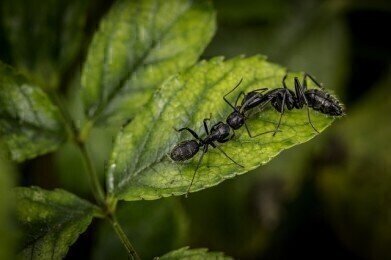News
Who Were the World's First Farmers?
Nov 09 2017
From golden wheat fields to lush tea plantations, the world is heavily dependent on agriculture. But according to the latest research from Smithsonian’s National Museum of Natural History, ants were the first species to engage in subsistence farming. Even more incredible is the fact that they've been doing it since shortly after dinosaurs died out.
A pre-historic practice
The paper was co-authored by entomologist Ted Schultz, inhouse curator of ants at Smithsonian’s National Museum of Natural History. Together with his colleagues, Schultz has confirmed that the attine ants of South America have been strategically cultivating crops and dividing labour for up to 65 million years. Their goal? Growing an edible fungus used to feed the colony.
There are over 200 species of attine ants, including 47 types of well-known leafcutters. Found in the forests of Central and South America, they're often seen carving up leaves and carrying them back to their colonies. The leaf segments are then used to grow certain varieties of edible fungi, with Schultz maintaining that the practice raises longstanding evolutionary questions about how ants transitioned from hunter gatherers to farmers. Schultz explains that once a species has made an ancestral switch, there's no looking back.
“It looks like possibly shortly after the ancestor of these ants started cultivating fungi, the ant lost the ability to make one of the amino acids, arginine," he explains. "So the idea is that it depends on the fungus for that amino acid. They probably can’t go back.”
Ants engage in symbiotic farming
Schultz asserts that the ants and the fungi maintain a symbiotic relationship, with both parties equally dependent on each other. It's this trait that differentiates ants from humans, with the study suggesting that the relationship may have started up to 66 million years ago.
“When I first started doing this, the way we thought of it was ant farmers are like little humans,” recalls Schultz. “And we’re pretty sure that we’re in charge of our crops. When I started working with mycologists, they had a different take on it. The fungal colony is sending out the ants to bring back food. I tend to think of it as nobody’s in control. It’s a symbiosis and selection is acting on the combination.”
Big lessons from tiny farmers
Schultz insists that humans have important lessons to learn from attines, including the importance of agricultural and environmental coexistence.
“We’re constantly coming up with herbicides or antibiotics to control pests. And the pests are constantly evolving countermeasures against those things,” says Schultz. “Somehow this system with the ants has been in an equilibrium for millions of years."
Universities play a pivitol role in scientific discoveries, including the latest insight from Smithsonian’s National Museum of Natural History. For a behind the scenes glimpse at one of the UK's top institutions don't miss 'Wide Eyed with Wonder: University of Nottingham Open their Doors to the Community.'
Digital Edition
Lab Asia Dec 2025
December 2025
Chromatography Articles- Cutting-edge sample preparation tools help laboratories to stay ahead of the curveMass Spectrometry & Spectroscopy Articles- Unlocking the complexity of metabolomics: Pushi...
View all digital editions
Events
Jan 21 2026 Tokyo, Japan
Jan 28 2026 Tokyo, Japan
Jan 29 2026 New Delhi, India
Feb 07 2026 Boston, MA, USA
Asia Pharma Expo/Asia Lab Expo
Feb 12 2026 Dhaka, Bangladesh



















